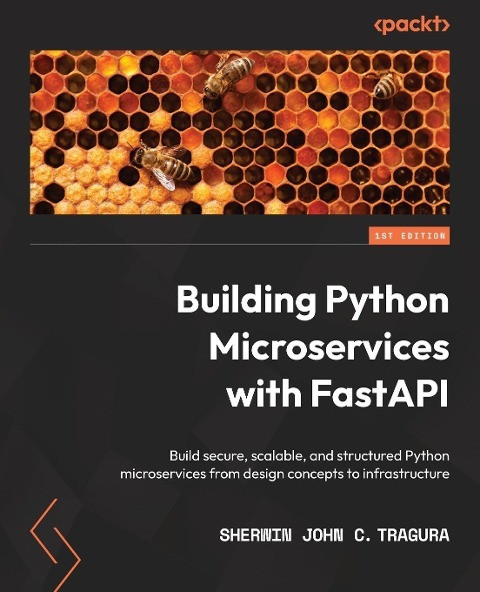
Building Python Microservices with FastAPI
Kurzinformation
inkl. MwSt. Versandinformationen
Lieferzeit 1-3 Werktage
Lieferzeit 1-3 Werktage

Beschreibung
Discover the secrets of building Python microservices using the FastAPI framework Key Features: - Provides a reference that contains definitions, illustrations, comparative analysis, and the implementation of real-world apps - Covers concepts, core details, and advanced integration and design-related topics - Imparts context, app templates, suggestions, and insights that are helpful to actual projects Book Description: FastAPI is an Asynchronous Server Gateway Interface (ASGI)-based framework that can help build modern, manageable, and fast microservices. Because of its asynchronous core platform, this ASGI-based framework provides the best option when it comes to performance, reliability, and scalability over the WSGI-based Django and Flask. When working with Python, Flask, and Django microservices, you'll be able to put your knowledge to work with this practical guide to building seamlessly manageable and fast microservices. You'll begin by understanding the background of FastAPI and learning how to install, configure, and use FastAPI to decompose business units. You'll explore a unique and asynchronous REST API framework that can provide a better option when it comes to building microservices. After that, this book will guide you on how to apply and translate microservices design patterns in building various microservices applications and RESTful APIs using the FastAPI framework. By the end of this microservices book, you'll be able to understand, build, deploy, test, and experiment with microservices and their components using the FastAPI framework. What You Will Learn: - Understand, orient, and implement REST APIs using the basic components of the FastAPI framework - Build asynchronous as well as synchronous REST services using the built-in pydantic module and asyncio support - Create small-scale and large-scale microservices applications using features supported by FastAPI - Build event-driven and message-driven applications using the framework - Create an asynchronous and synchronous data layer with both relational and NoSQL databases - Perform numerical and symbolic computations with FastAPI Who this book is for: This book is for Python web developers, advanced Python developers, and backend developers using Flask or Django who want to learn how to use the FastAPI framework to implement microservices. Readers familiar with the REST API and microservices will also benefit from this book. Some parts of the book contain general concepts, processes, and instructions that intermediate-level developers and Python enthusiasts can relate to as well. Table of Contents - Setting Up FastAPI for Starters - Exploring the Core Features - Investigating Dependency Injection - Building the Microservice Application - Connecting to a Relational Database - Using a Non-Relational Database - Securing the REST APIs - Creating Coroutines, Events, and Message-Driven Transactions - Utilizing Other Advanced Features - Solving Numerical, Symbolic, and Graphical Problems - Adding Other Microservice Features von Tragura, Sherwin John C.
Produktdetails

So garantieren wir Dir zu jeder Zeit Premiumqualität.
Über den Autor

- Hardcover
- 406 Seiten
- Erschienen 2023
- Packt Publishing

- Kartoniert
- 392 Seiten
- Erschienen 2018
- Manning

- Kartoniert
- 317 Seiten
- Erschienen 2022
- O'Reilly Media

- Kartoniert
- 276 Seiten
- Erschienen 2020
- O'Reilly Media

- Hardcover
- 605 Seiten
- Erschienen 2020
- Apress

- Hardcover
- 252 Seiten
- Apress

- Hardcover
- 826 Seiten
- Erschienen 2021
- Packt Publishing

- Hardcover
- 302 Seiten
- Erschienen 2023
- Packt Publishing

- Kartoniert
- 382 Seiten
- Erschienen 2019
- Apress

- Taschenbuch
- 304 Seiten
- Erschienen 2021
- Addison Wesley

- paperback
- 366 Seiten
- Erschienen 2018
- Packt Publishing

- Taschenbuch
- 325 Seiten
- Erschienen 2022
- Manning Publications

- Hardcover
- 372 Seiten
- Erschienen 2014
- Apress

- Taschenbuch
- 544 Seiten
- Erschienen 2018
- Packt Publishing

- Kartoniert
- 350 Seiten
- Erschienen 2020
- O'Reilly Media

- Hardcover
- 284 Seiten
- Erschienen 2018
- Packt Publishing




 bestellen
bestellen





















